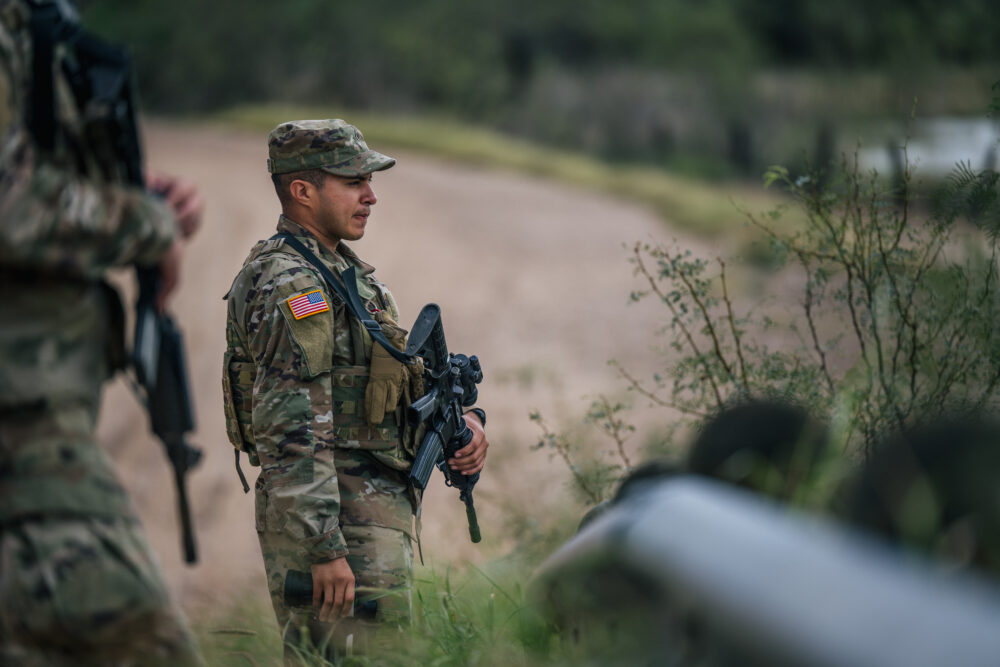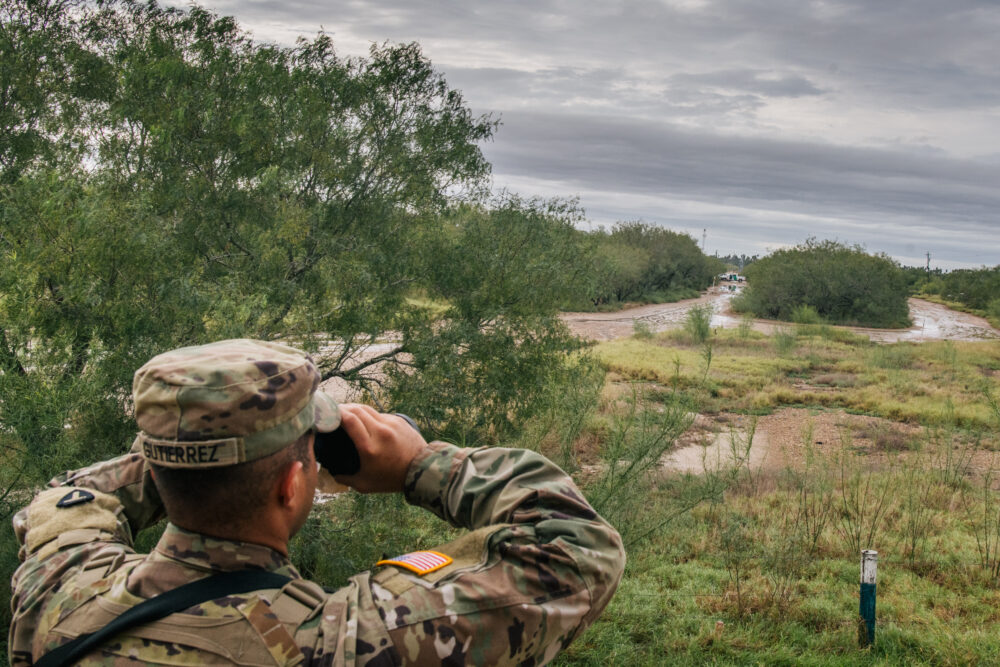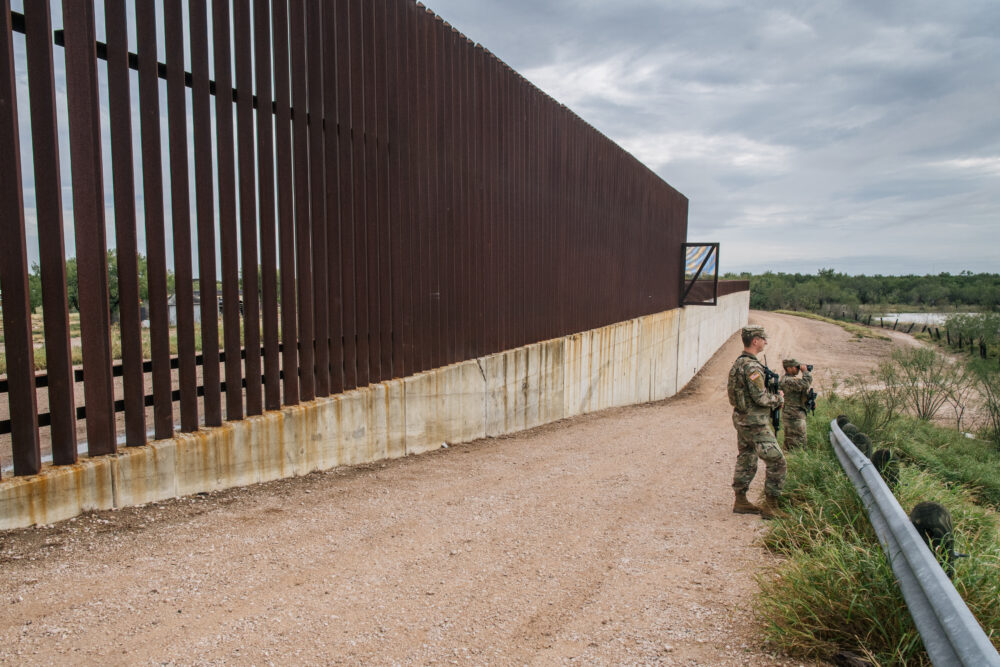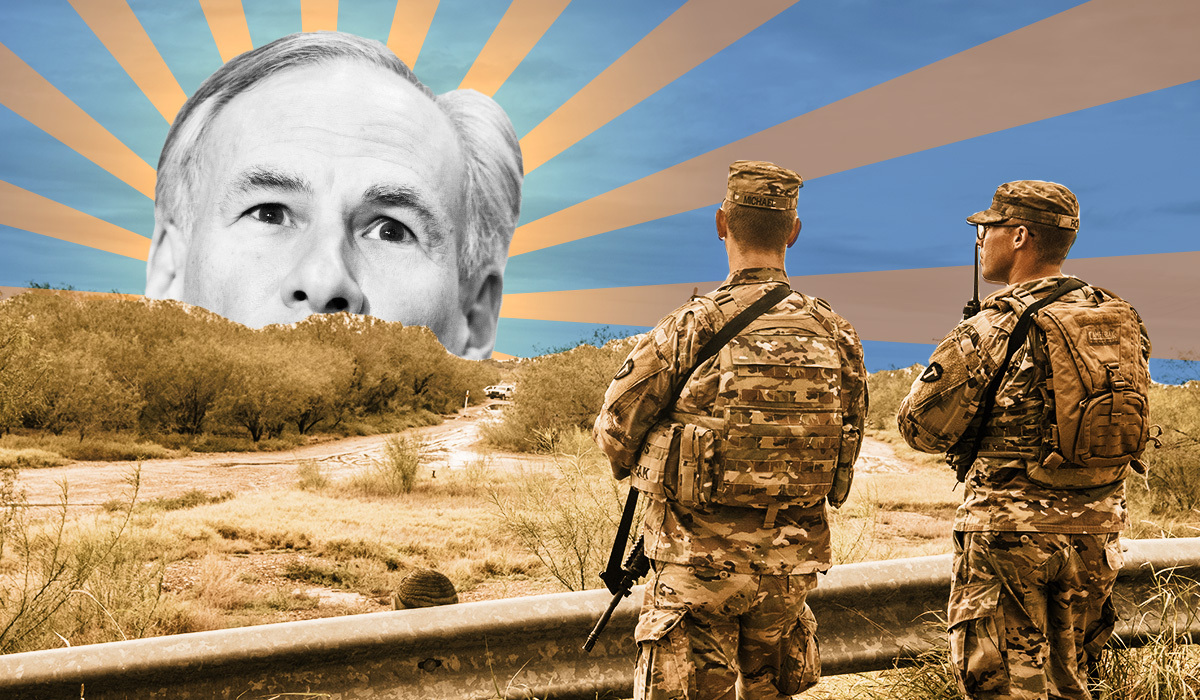Today has a special significance for Texas Gov. Greg Abbott (R).
Today’s the day Texas voters will decide whether he deserves the Republican Party’s nomination to run for a third term in office. If successful this week and in November’s general election, Abbott will soon trail behind only Rick Perry as the longest-serving governor in the state’s history, a crowning achievement for a shrewd culture warrior who’s positioned himself against the Biden administration and openly considered a 2024 presidential run.
And as Republican voters decide, Abbott is hitting one point harder than any other: stopping migration from Mexico across the southern border. “SECURING THE BORDER,” reads the top issue on Abbott’s website. On social media, he seethes about the Russian and Chinese migrants detained at the border — “We will get to the bottom of it” — and declares that, in contrast to the Biden administration, “TX is building a wall.”
But the “we” in Abbott’s statement isn’t Abbott: It’s the Texas Military Department, and specifically, thousands upon thousands of members of the Texas National Guard who’ve been deployed to the border on a “disaster” basis since last fall. The deployment, named “Operation Lone Star,” is Abbott’s mission to use state military resources to supplement federal immigration law enforcement.
The ploy has come with a steep price: Thousands of National Guard members have been away from their families for months at a time, with no end in sight. They’re living in densely-packed trailers and dealing with an array of pay issues and missing equipment. Many feel as though they’ve been sent to do a political errand, not an essential state security operation.
Six members on the mission have died since October, four of those from suicide, and reports of alcohol abuse, depression, and anger at the state are common.
Abbott’s competitors have jumped on a growing wave of discontent from National Guard troops and their loved ones. “Why is this happening? Because we rushed into a failure,” Allen West, the state GOP’s former chair and Abbott’s top primary competition, told Texas Public Radio recently. “We decided that it was all about political optics. It was about a political opportunity.” Beto O’Rourke, the frontrunner in the Democratic primary, called the situation “an embarrassment.”
And in recent weeks, some new voices have joined the discussion: the troops themselves. In online communities, media exposés, leaked morale surveys and even a fledgling union drive, Texas National Guard members are venting their frustration at being used for a seemingly endless political stunt.
“All of the issues with pay, and benefits, and housing and equipment — those are all things that soldiers will overlook if given a clear task and purpose, and an end state that is achievable. But because there’s no end state and there’s no task and purpose, it really is an open secret that this is a political ploy.”
Several National Guardsmen deployed to the border as part of the mission, who spoke on the condition of anonymity but whose identities TPM verified, described anger and even despair at what they viewed as a fatally flawed, political mission.
“It’s very obvious from the way this mission is run that the real priority is having 10,000 people on the border so that Greg Abbott can tweet about it,” said one member of the Guard who described manning an observation point on the border.
Nan Tolson, a spokesperson for Abbott, told TPM in a statement that “Texas will do whatever it takes to secure our southern border and protect Texans in President Biden’s absence.”
“Serving in the Guard is not easy–whether it is a deployment to Iraq or to the Texas border,” she added. “That’s why we have heard from countless Texans, community leaders, and law enforcement who are grateful for the hard work and impact of service members who are stationed at the border.”

‘I’ve Never Felt This Way Before’
Unlike long-term overseas deployments, troops were shipped out to the U.S.-Mexico border on a “disaster” timeline — immediately. And as Abbott’s political opponents and the Guard members themselves have said in the months since, that left some basics severely lacking: Troops dealt with late and inaccurate pay for months, sometimes requiring hours-long trips to pick up physical checks. Even now, Guard members told TPM, checks are often late. Other National Guardsmen are still missing equipment, like cold weather gear and body armor.
A spokesperson for the Texas Military Department, Col. Rita M. Holton, told TPM that the department provides “appropriate gear” to all personnel who need it for their duties, and that “over 90%” of pay discrepancies had been resolved. Troops across the operation are currently housed in a mix of trailers, dormitories and hotel rooms, though “no facility is utilized at greater than 60%” capacity, Holton said. Ultimately, she said, all basecamps would transition to “dorm-style” housing.
In a recent weekly update, Operation Lone Star Commander Monie Ulis sought to cast things in a positive light: “Pay discrepancies are dwindling, teammates are moving into the first constructed dorm next week, and leadership training is being scheduled across the [joint operations area],” he wrote. An attached memo reminded service members not to consume any CBD products or drink in uniform.
The dispatches from leadership haven’t been enough for everybody.
“I work probably two hours a day. I just go back to my room and drink. And then rinse and repeat. I’ve been doing this for four months,” one member of the Guard told TPM. “I really don’t have a problem with the mission. I think the execution was the issue, and the fact that we have way too many soldiers down at the border, and a lot of them aren’t doing jack shit.”
The Guard member said he’d been called to the border on just a few days’ notice, leaving behind a good paying job and a family member with a complicated medical issue. He said he recently reached out to a behavioral health specialist with the military because he was worried about doing something foolish, like drinking and driving or taking his own life.
“I don’t like drinking, but I got to the point where it’s how I go to sleep,” he said. “I’m at a weird point of desperation. I’ve never felt this way before.”
One medic deployed as part of Operation Lone Star noted the disturbing number of suicides on the mission.
“We’ve had a ridiculous number of deaths,” he said. (In her statement to TPM, Holton noted that TMD provides a “robust” set of services for Guard members, including substance abuse prevention programs, behavioral health providers and chaplains.)
A Texas National Guard officer deployed on the operation told TPM that Guard members might overlook issues with pay and equipment if they have clear objectives — something he said Abbott and others have failed to provide.
“All of the issues with pay, and benefits, and housing and equipment — those are all things that soldiers will overlook if given a clear task and purpose, and an end state that is achievable,” the officer said. “But because there’s no end state and there’s no task and purpose, it really is an open secret that this is a political ploy.”

‘What Am I Doing Here?’
Abbott announced Operation Lone Star in March last year, a few weeks after Joe Biden’s inauguration and a year before the Texas primary, with a press statement proclaiming that “the crisis at our southern border continues to escalate because of Biden Administration policies that refuse to secure the border and invite illegal immigration.”
The operation began with a few hundred National Guard members. But in the fall, it grew — and rapidly, leaving military officials scrambling for months afterward to address issues with paychecks, housing, and logistics.
The change occurred roughly around the time of an uptick of Haitian migrants at the border, and also around the same time as a campaign from Fox News star Tucker Carlson: On Sept. 21, Carlson demanded to know why Abbott “hasn’t called the National Guard to seal the Texas border and protect the rest of us from this invasion.”
A week later, an official with the Texas Military Department announced that 1,500 troops “will be flowing into the region over the next four weeks.” (The Army Times subsequently reported that preparations and orders for the deployment were issued before Carlson’s monologue.) In early October, Abbott ordered 2,500 more troops to the border.
By the end of the month, Abbott appeared on Carlson’s show, boasting of 6,500 National Guardsmen and Department of Public Safety troopers on the border. The military personnel were laying down razor wire and using shipping containers as makeshift border barriers, he said.
“As the months progressed, I realized that a lot of people were just sitting around, not doing anything.”
Still, only federal law enforcement officers, like Border Patrol agents, can legally detain migrants and asylum seekers for crossing the border between ports of entry. And while Abbott has ordered Texas law enforcement to arrest people for violations like trespassing — a legally questionable maneuver that has stuffed border courts and jails full of migrants — Texas National Guard troops are often left to flag migrants and asylum seekers to other authorities for arrest or intake.
“I feel like my work here is a complete and total waste of time,” the Guard member working the observation point told TPM. “Most of the people crossing here are seeking asylum, often from Venezuela, they have no intention of causing trouble. If [Border Patrol] knows they’re coming, and my only job is to call BP, what am I doing here?”
The Texas National Guard officer, who was deployed in October, quickly realized that the border “crisis” wasn’t as advertised.
“It didn’t seem too crisis-like,” the officer recalled thinking when he first arrived. “Then, as the months progressed, I realized that a lot of people were just sitting around, not doing anything.”
The officer said he soon found himself unable to answer a simple question from his subordinates: Why were they there?
“I really couldn’t give them a good answer,” he said.

‘I’m A One-Issue Voter’
If Abbott gets more than half of Tuesday’s primary vote, he can avoid a run-off election. And he likely will: According to one recent poll, 60% of would-be primary participants said they’re supporting the incumbent, more than twice the combined support of his two top Republican competitors.
“Everybody knows what the mission is down here, and it’s to get Gov. Abbott reelected,” the medic deployed as part of Operation Lone Star told TPM.
“It’s to supply red meat for his voting base. And we’re doing a damn good job of that, apparently.”
Jeremy Teigen, a political science professor at Ramapo College who studies the politics of military service, said in an interview that there are plenty of examples of governors politicizing their state national guard. If troops are compelled to speak to reporters out of frustration, he said, “it’s because they’re rightfully identifying that they’re being used as a political prop here.”
Some Guard members who spoke to TPM vented about the immense cost of paying, housing, feeding and supplying a border mission that they saw as unnecessarily large.
Others, who noted they were Republican voters who’d supported Abbott in the past, said his actions on Operation Lone Star had changed their minds.
“Operation Lone Star was absolutely the straw that broke the camel’s back,” the officer said, adding separately: “Anybody who’s willing to abuse the military that much, hell no.”
The medic said he felt Abbott had treated troops “like lines on a spreadsheet.” But he noted a word of hope in the form of chatter from the Guard members around him: That if Abbott wins the Republican primary outright, he might have completed one of the operation’s primary missions.
“I’m a one-issue voter,” the medic said. “I want to go home.”

